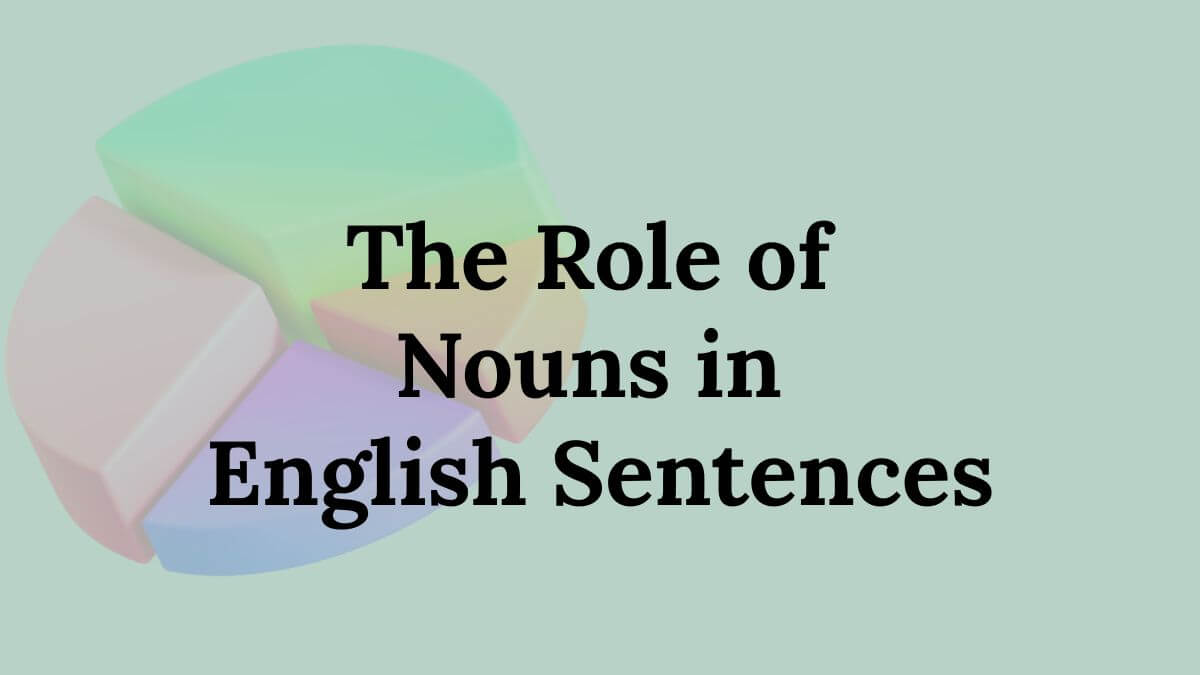Nouns are one of the most fundamental building blocks of the English language. Without them, constructing even the simplest sentence becomes nearly impossible. The role of nouns in English sentences is not just to name things, but to anchor meaning and support grammatical structure. IN this blog post, we’ll explore what nouns are, their types, and how they function within a sentence. Whether you’re an English learner or an educator, understanding how nouns work will greatly improve your grammar and writing skills.
What Is a Noun?
A noun is a word used to identify a person, place, thing, idea, or quality. In simpler terms, nouns are naming words. They help us label and identify everything in our world.
Examples:
- People: teacher, doctor, Emma
- Places: school, London, beach
- Things: book, chair, water
- Ideas: freedom, honesty, love
Nouns help us talk about things, describe events, and share thoughts. In every complete sentence, you’ll almost always find at least one noun.
Why Are Nouns So Important in English Sentences?
The role of nouns is central to sentence structure. They often act as the subject, the object, or the complement in a sentence. Let’s break that down:
Nouns as the Subject of a Sentence
The subject is the “doer” of the action or what the sentence is about. Nouns are most commonly used in this position.
Example:
- The dog barks loudly.
(“The dog” is a noun and also the subject.)
Nouns as the Object
The object receives the action. This can be a direct object or an indirect object.
Examples:
- She kicked the ball.
(“The ball” is a noun and the direct object.) - I gave John a gift.
(“John” is a noun and the indirect object.)
Nouns as Complements
Nouns can complete the meaning of linking verbs like be, become, or seem.
Example:
- My sister is a nurse.
(“Nurse” is a noun and a subject complement.)
Different Types of Nouns in English
To fully understand the role of nouns, we need to look at their various forms and functions. Nouns are classified into several types:
Common Nouns and Proper Nouns
- Common Nouns: General names (e.g., city, car, book)
- Proper Nouns: Specific names (e.g., Dhaka, Toyota, Harry Potter)
Proper nouns always begin with a capital letter.
Countable and Uncountable Nouns
- Countable: Can be counted (e.g., apple/apples, chair/chairs)
- Uncountable: Cannot be counted (e.g., water, sugar, advice)
Concrete and Abstract Nouns
- Concrete: Can be seen or touched (e.g., table, phone)
- Abstract: Ideas or qualities (e.g., courage, time)
H3: Collective Nouns
- Represent a group as a single unit (e.g., team, family, audience)
Example: The team is winning the match.
Noun Phrases and Their Functions
A noun phrase is a group of words that acts as a noun in a sentence. It usually consists of a noun and its modifiers.
Example:
- The tall man with a red hat is my uncle.
(Here, “The tall man with a red hat” is a noun phrase acting as the subject.)
The Role of Nouns in Sentence Clarity
Nouns make sentences clear and meaningful. Without nouns, we wouldn’t know who or what we’re talking about.
Let’s compare:
Is running fast.
The athlete is running fast.
In the first sentence, the subject is missing. In the second, the noun “athlete” makes the meaning clear. This highlights how the role of nouns is essential for effective communication.
Nouns and English Sentence Patterns
In English, most sentence patterns rely on nouns:
- Subject + Verb: Dogs bark.
- Subject + Verb + Object: She eats rice.
- Subject + Linking Verb + Complement: He is a teacher.
In each pattern, the role of nouns is crucial—either as the subject, object, or complement.
Tips for Using Nouns Correctly
Here are a few tips to strengthen your understanding and usage of nouns:
- Use articles correctly: “a,” “an,” and “the” are often used with nouns.
- Watch for singular/plural forms: Don’t say “two cat” — say “two cats.”
- Capitalize proper nouns: Names of people, countries, days, and brands must be capitalized.
- Learn irregular plural forms: Child → children, mouse → mice
The Role of Nouns in Writing and Speaking
In both writing and speaking, the role of nouns is foundational. From naming things in a story to identifying who’s doing what in a conversation, nouns help us construct meaningful language.
Example in Writing:
Maria opened the window to let in the breeze.
Example in Speaking:
“Teacher, I forgot my notebook.”
In both examples, nouns help create clarity and context.
Read More:
10 Simple English Dialogues for Beginners: Grow Your Speaking Skills
7 Common Mistakes with Auxiliary and Modal Verbs – And How to Fix Them!
Final Thoughts: The Power Behind Every Sentence
Understanding the role of nouns in English sentences is one of the most effective ways to strengthen your grammar. Nouns form the backbone of sentence structure. From identifying people to expressing abstract thoughts, they carry the meaning of what we communicate.If you’re serious about mastering English, start by mastering nouns. Once you do, forming correct and meaningful sentences becomes much easier.
